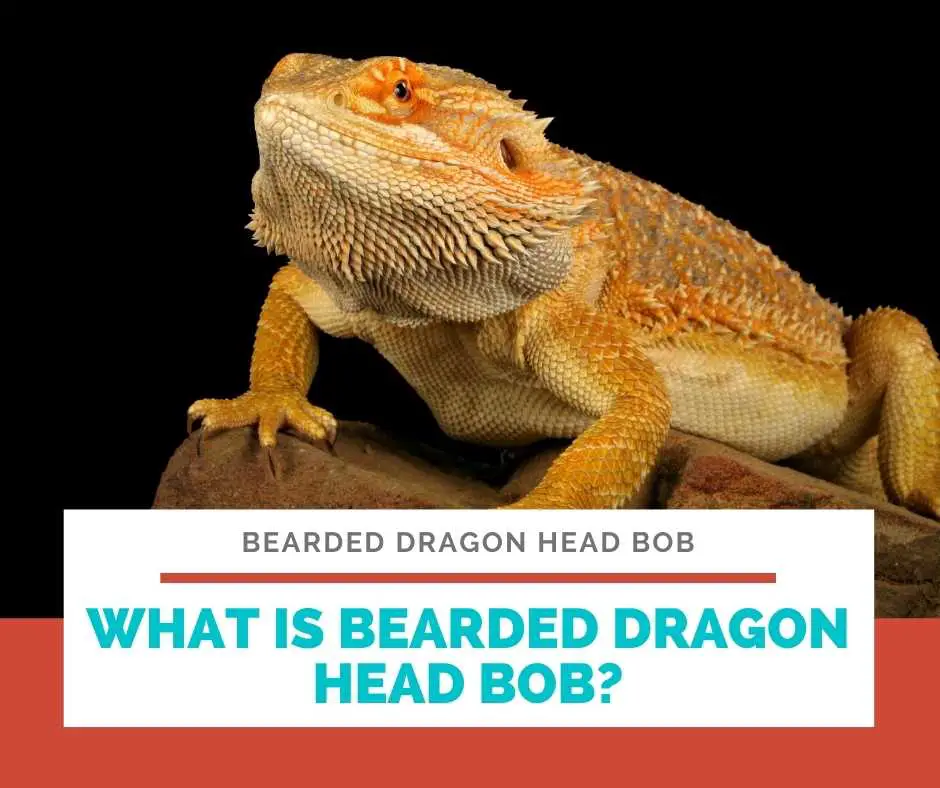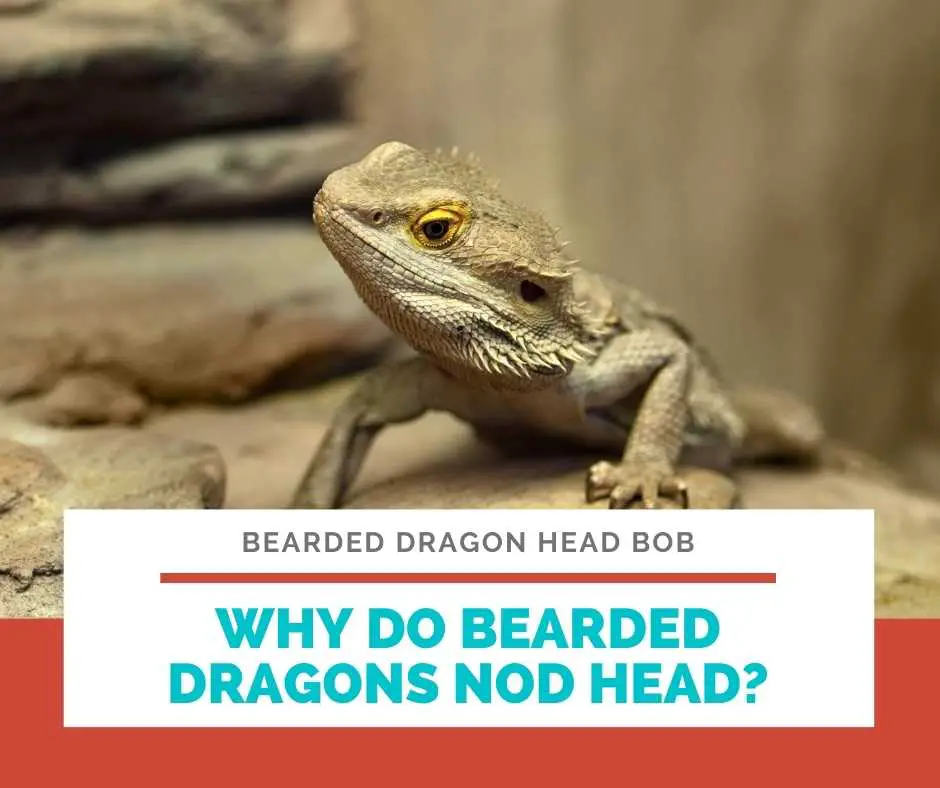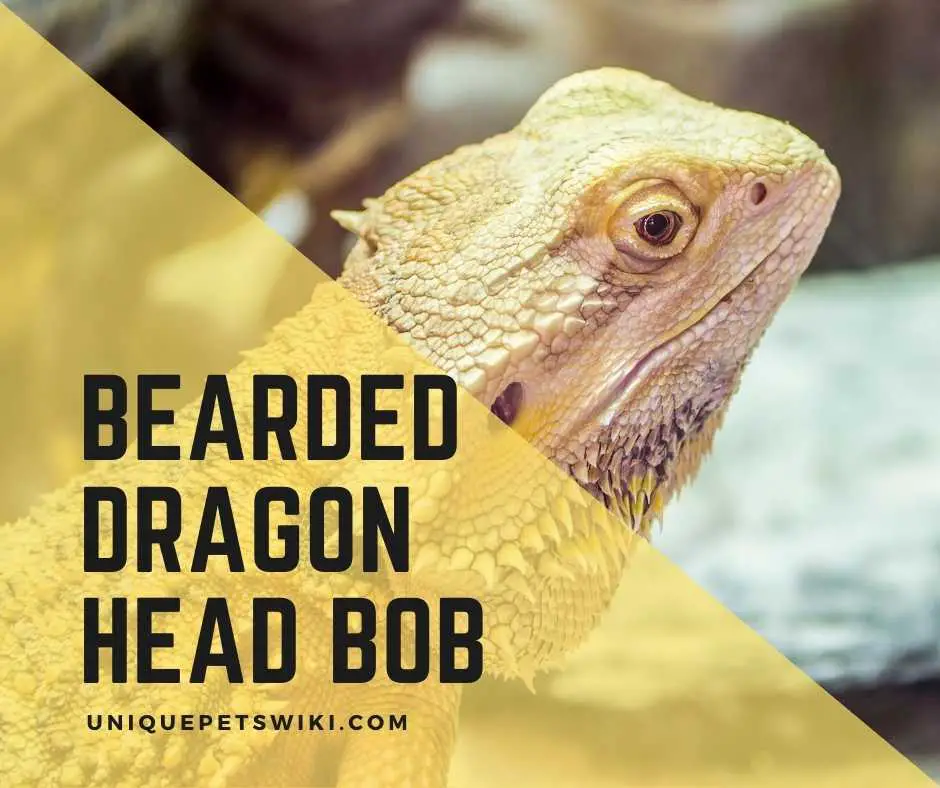Bearded dragons don’t communicate by sound; instead, they use specific body language such as head bobbing to explain their health, mood, and feeling.
It is important to understand the different gestures that beardies show to know how your beardie is progressing and its health condition. Giving a healthy diet and perfect habitat is one way to care for your pet properly, but that’s not enough.
You also need to be aware of the different behaviors that bearded lizards display. In this article, I’m going to tell you what bearded dragon head bob means, when it happens, and more.
Contents
What is Bearded Dragon Head Bob?

Head bobbing is popular in all species of bearded dragons, and it is when a beardie raises and lowers its head over and over again.
Males are more prone to head bobbing, and they tend to do it quickly. However, female dragons will also bob their head but at a slow pace.
Several situations will cause a bearded dragon to nod the head, but I will explain that shortly. There is no harm to believe that something is making your lizard nod its head, but it can also be one way to show how it feels.
Bearded dragon head bob is not dangerous, and if it happens, just know that the high chance is that there isn’t something serious causing it. So, you don’t need to worry about anything concerning a bearded dragon nodding head.
The only thing that can disturb you is when you notice head bobbing and other signs that may be of concern accompanying it, such as a beard turning black. You need to be watchful when it comes to bearded dragon behaviors.
Why Do Bearded Dragons Nod Head?

As I mentioned above in the article, head nodding is a common behavior in the beardies, and it talks much about their mood and feeling or to express something.
Head bobbing can be a sign of many things. The dragon not only displays this gesture towards another dragon but also to a person or another animal.
You may be wondering why a beardie would bob its head at a person. To some people, it is something they will enjoy, but others will be surprised, especially if they don’t have a clue about what is happening.
But rest assured that bearded dragon head bob is something normal and can occur due to several reasons. Let’s see the situations at which the bearded lizards show head bobbing.
Head Bobbing as a Sign of Dominance
Keeping more than one dragon in a cage will most of the time encourage them to fight to establish their ranking. The beardies are solitary lizards and appreciate more if they are living on their own.
Having them together in the enclosure can make aggression over territory. In the process of fighting, one beardie must emerge the winner, and it becomes the boss in that tank.
Now, the dominant beardie influences other bearded dragons, and it always reminds them of the dominance through a fast-head bobbing. Also, a dragon bobbing its head quickly may signify aggression and territoriality, and it is also common in males.
Well, one dragon jiggling head swiftly at another dragon is often due to territorial and dominant reasons.
If the dragon is aggressive and starts to jiggle the head, sometimes they will display other signs like beard puffing and darkening to make them look much larger and scarier. This is also part of dominance to express superiority.
Head Bobbing as a Sign of Submission
When a dominant dragon in the cage nods its head speedily, he expects the fellow beardies to respond with a slow head bob or arm wave. On the contrary, a fast head bob response is a challenge, and it means that there will be a fight to establish the territory again.
However, if the submissive beardies recognize and accept that the dominant dragon is truly the boss, they will instead answer back with a slow head nod. This is how they show their submission.
Bearded Dragon Head Bob During Mating
During the mating season, the beardies tend to display several behaviors like head nodding, arm-waving, black beard, etc. Generally, the males will fight with each other as they are trying to win a specific female.
Also, male bearded dragons appear so aggressive during this period, and they are more territorial. A male eyeing on a certain female will express himself through a violent jerky head bob. In the process, it will also be informing other males to stay away.
A receptive female, on the other hand, exhibits a slow head nod and steady arm waving to show that she is fine to be mated by that male. Unlike males, female dragons are less aggressive during mating season.
Bearded Dragons Bobbing Head at the Owners
It is not unheard of that bearded lizards will nod their head at the owners. It does happen and is common. The question is, why do beardies do that to a human? Is it a bad or good sign? Aha, stay calm, you will get the answer in just a moment.
It is clear now that all beardies tend to bob their head, whether male or female, and they do that for different reasons. So, if you notice your pet is head jerking at you, there isn’t anything to make you worry. Your friend is just trying to say hello.
This often occurs when you approach your pet in its terrarium. The beardie is happy to see you, and you will recognize that by observing a fairly slow head nod.
Also, if your dragon was bought recently, you are likely to see the head bobbing behavior, but this time it means something different. The beardie will bob the head in a fast motion and may show other signs like puffing up to look bigger.
By this, your pet is trying to tell you that it is the boss, and you should not touch him/her. This is quite interesting but, at the same time, weird. But don’t worry, your friend just needs time, and it will get used to you.
You can create a good bond with your pets by avoiding anything that can upset them. This is the way to go; handle your new pet gently and for small periods during the beginning. As time passes, increase the handling gradually to help with the pet’s confidence.
Head Nodding at other Household Pets
Sometimes, a bearded dragon may not get along well with other household pets like birds, cats, dogs, etc. This is most common, especially when you bring a new pet to your home. The beardie gets uncomfortable seeing the new pet, and it will start to bob the head.
However, with time, the beardie will realize that the other pet does not mean any harm, and head bobbing should stop quickly. But if the dragon persists with the head-nodding anytime the other pet is around, you can choose to relocate the enclosure to where the two pets will not see each other.
If a bearded dragon is subjected to a scary environment for a long time, it can raise the stress level and can result in health problems. Make sure you correct that before the worst happens.
There is a time when dragons may start to bob their head at the existing pets in your home when they have never done that before. It happens when the other pet becomes a threat to the dragon’s territory.
A beardie may also nod its head even to other household pets during the breeding season. Again, monitor the situation, and if it happens frequently, make sure to keep the pets away from each other.
Head Nodding at Items of clothing and Toys.
A bearded dragon can mistake a toy or item of clothing like gloves or socks to be a predator, and it will be scared. The beardie will eventually bob its head because it is intimidated.
If your dragon is bobbing the head and is not due to the above situations, you can check your house and see if the pet is seeing any toy or item of clothing or jewelry. Such materials are harmless to you and me and are an everyday thing, but for beardies, it may be different.
If there is anything of the mentioned item or any other material you might suspect that is around, it will be good if you remove them.
Remove every item at a time and observe how the dragon behaves. This will help you to know the specific material that is making the beardie to be intimidated.
The beardie will also bob its head in other situations such as, seeing its reflection and changing the tank to a new location.
Is Bearded Dragon Head Bobbing Healthy?
Most of the time, a bearded dragon will nod the head to respond to different stimuli and to show intentions or mood. There are other behaviors a beardie can display, and they all help to communicate what is inside. They have to do that because they can’t speak.
So, it is healthy for a dragon to bob the head; you only need to understand their different gestures to know what is happening and how you need to respond.
However, if your dragon is bobbing the head and it seems unhappy, it’s not something to take lightly. You need to quickly identify the root cause for that and solve it immediately. Too much stress is dangerous and can harm your beardies.
Bearded dragon head bobbing in most cases is healthy, but, on several occasions, when the dragon is aggressive, it might be unhealthy.
Wrapping Up
As I conclude, I want you to know that the bearded dragon head bob is a typical and natural behavior in the beardies. It can occur due to many reasons, but there isn’t anything dangerous causing it.
There is a high chance that the beardie is nodding the head as a sign of dominance, submission, due to the new environment, or less obvious due to the other reasons we have discussed above.
